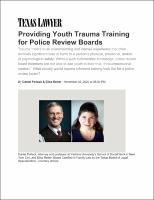Please use this identifier to cite or link to this item:
https://hdl.handle.net/20.500.12202/6305Full metadata record
| DC Field | Value | Language |
|---|---|---|
| dc.contributor.author | Pollack, Daniel | |
| dc.contributor.author | Reiter, Elisa | |
| dc.date.accessioned | 2020-11-02T23:44:40Z | |
| dc.date.available | 2020-11-02T23:44:40Z | |
| dc.date.issued | 2020-11-02 | |
| dc.identifier.citation | Pollack, Daniel and Reiter, Elisa. Providing youth trauma training for police review boards. Texas Lawyer, (November 2, 2020). | en_US |
| dc.identifier.issn | 0267-8306 | |
| dc.identifier.uri | https://www.law.com/texaslawyer/2020/11/02/providing-youth-trauma-training-for-police-review-boards/?cmp_share=share_facebook&fbclid=IwAR0fxqobC-IHp5pc7MX86rxU5qf-CukCWm3shz-YO6WaJH-hKD5K_FtTKMY | en_US |
| dc.identifier.uri | https://hdl.handle.net/20.500.12202/6305 | |
| dc.description | Commentary / Article | en_US |
| dc.description.abstract | We previously asserted that trauma “refers to an overwhelming and intense experience that often involves significant loss or harm to a person’s physical, emotional, and/or or psychological safety. Without such rudimentary knowledge, police review board members are not able to see youth in their true, three-dimensional context.” What exactly would trauma-informed training look like for a police review board? | en_US |
| dc.language.iso | en_US | en_US |
| dc.publisher | Austin, Tex. : Butterworth Legal Publishers | en_US |
| dc.relation.ispartofseries | Texas Lawyer;November 2, 2020 | |
| dc.rights | Attribution-NonCommercial-NoDerivs 3.0 United States | * |
| dc.rights.uri | http://creativecommons.org/licenses/by-nc-nd/3.0/us/ | * |
| dc.subject | youth trauma training | en_US |
| dc.subject | police review boards | en_US |
| dc.subject | trauma-informed training | en_US |
| dc.title | Providing youth trauma training for police review boards. | en_US |
| dc.type | Article | en_US |
| dc.contributor.orcid | 0000-0001-7323-6928 | |
| local.yu.facultypage | https://www.yu.edu/faculty/pages/pollack-daniel | |
| Appears in Collections: | Wurzweiler School of Social Work: Faculty publications | |
Files in This Item:
| File | Description | Size | Format | |
|---|---|---|---|---|
| Pollack Reiter 2Nov20 art Texas Lawyer Providing youth trauma training for police review boards.pdf | 189.43 kB | Adobe PDF |  View/Open |
This item is licensed under a Creative Commons License

